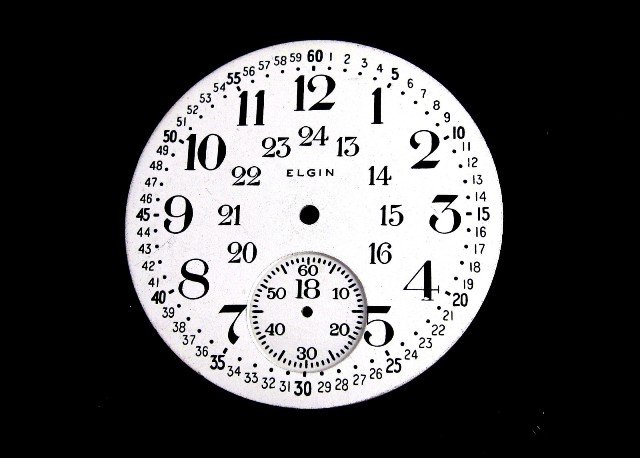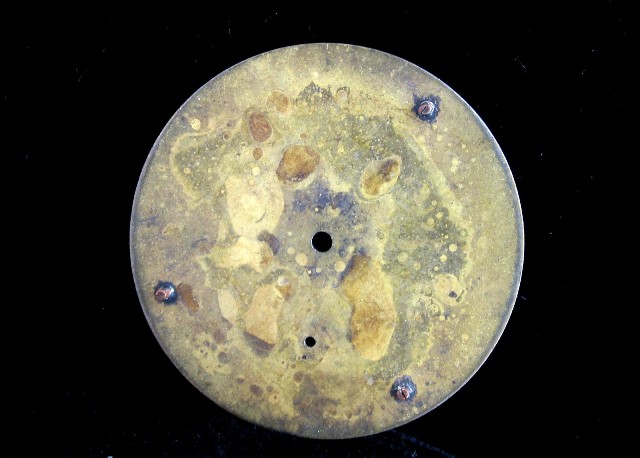
| WWT Shows | CLICK TO: Join and Support Internet Horology Club 185™ | IHC185™ Forums |

|
• Check Out Our... • • TWO Book Offer! • |
Welcome Aboard IHC185™  Internet Horology Club 185
Internet Horology Club 185  IHC185™ Discussion Site Main Page
IHC185™ Discussion Site Main Page  Horological Discussions, Questions and Answers
Horological Discussions, Questions and Answers  Pocket Watch Discussions
Pocket Watch Discussions  question about an Elgin metal dial
question about an Elgin metal dial
 Internet Horology Club 185
Internet Horology Club 185  IHC185™ Discussion Site Main Page
IHC185™ Discussion Site Main Page  Horological Discussions, Questions and Answers
Horological Discussions, Questions and Answers  Pocket Watch Discussions
Pocket Watch Discussions  question about an Elgin metal dial
question about an Elgin metal dialGo  | New Topic  | Find-Or-Search  | Notify  | Tools  | Reply to Post  |  |
| IHC Member 1369 |
I have browsed a few early threads about metal dials but did not see any specific info on identifying them as original or more recent replacements. I recently obtained the dial pictured below and wonder if there are ways to tell if it is original or not. It is not white as it appears in the photo. More of a goldish/bronze-ish colour. Any help appreciated.  | ||
|
| IHC Member 1369 |
and here's the back  | |||
|
| IHC Life Member |
Ralph that is a great topic. I always look at the back as some are marked Swiss, however Swiss metal dials were imported by American jewelers and some (I believe) American companies. I had a Waltham metal indicator dial that came from a late model Waltham indicator watch that I knew for certain was purchased new from a local jeweler. That had a Swiss marked Waltham metal indicator dial. Deacon | |||
|
| IHC Member 1369 |
Hi Deacon, I recall reading someplace about that. I think in the early days of making the metal dials the American manufacturers got them from Swiss companies but eventually started making their own. I think that was well back pre-1900 but could be wrong. I'll check around to see if I can find that reference again. I did think, when I first saw the photos of this dial, that it could be paper that was attached to something but now that I can examine the dial carefully it really does seem to be all metal with some kind of surfacing and the numbers have a raised feel to them. | |||
|
| IHC Life Member |
Ralph I just acquired a 16s Hampden New Railway 21j movement that had what appeared to be the late model Dueber Hampden black Arabic numeral rairoad dial. Upon closer examination it is a metal dial that is a painted late model dial and the first one I have ever had. I am fond of the late model 16s Dueber Hampden dials but never realized they did a metal version Deacon | |||
|
Here is one of the gold/bronze colored ones but this one is marked "Made in USA"  | ||||
|
| IHC Member 1369 |
Very nice dial, Claude, and seems to be the same colour as mine. Thanks for posting the photo. | |||
|
| IHC Vice President Pitfalls Moderator IHC Life Member |
Ralph, Your dial looks like a recently-made replacement to me. Painted metal replacement dials have been made since the early 1900's. Original porcelain enamel dials were easily damaged by incompetent watchmakers, so there has always been a ready market for them. So just because a metal dial looks old, that's no guarantee it's original. Of course some watches had painted metal dials as original equipment, like the 4992B and the example Deacon pointed out. Those are the only ones I want in my collection, examples where I know for a fact that metal dials were factory-installed. Bottom Line: I generally assume any painted metal dials I find are replacements, unless I have proof positive to the contrary. Best Regards, Ed | |||
|
| IHC Member 1369 |
Hi Ed, painted as opposed to what? And when the word 'painted' is used I get an image of some guy with a little paint brush How are these metal dial actually made? I have never come across a description of that. Thanks | |||
|
| IHC Vice President Pitfalls Moderator IHC Life Member |
They are typically spray painted white (you can often see overspray on the back side), and then the graphics are silk-screened. Best Regards, Ed | |||
|
I think the problem comes about because I have seen examples in ads where nearly all of the major brands produced "painted metal" dials and sometimes it is tough to know if these were factory replacements or after-market replacements. In the case of my dial, I am positive that it is not a later Swiss replacement since it is marked Made in USA but it would be tough to prove that Elgin made it if there is no documentation such as a sales ad or catalog showing it. This also brings up another topic if these replacement dials were from the pre-60's era and as far back as the early 1900's, should you even discount a watch for having one, to me much like a Ferguson dial (after-market replacement) and some early Montgomery dials (after-market replacement. I have a 24hr version that is a thicker metal disk (about the total thickness of a porc dial) and it does not have overspray on it and clearly was designed to fit an Elgin, so it is not the later thinner metal replacements that are out there in the market now. With some people so hung up n originality that they will leave a very high end movement in a brass-out, crapped out case I would not put one of these on one of my higher end watches but some of my mid-segment watches I would not have an issue with it since this is what happened in the day. I would not blame the watch-makers all the time since if you dropped your watch and the porc dial busted and tossed a few chunks and you took it to a watch repair place to replace the staff and you mentioned hey the dial is busted also, I am sure the repair place had some OEM dial and some after-market replacement dials and as long as the dial would meet the customer's requirements (price being one)and if it was used for RR service as long as it met the RR requirements then the customer may have made a decision based on replacement pricing. I am not sure there is anything about the dial I posted that would exclude it from RR service and I have a couple of other metal dials that probably would have passed most RR requirements. | ||||
|
| IHC Life Member |
Claude I am with you. Years ago an 85 year old watchmaker in Omaha told me that the metal dials were sold as non breakable replacements (and less expensive) for the porcelain dials and were fairly popular with the railroaders. I personally like the porcelain but metal can be legitimate too. Deacon | |||
|
| Powered by Social Strata |
| Your request is being processed... |
|
Welcome Aboard IHC185™  Internet Horology Club 185
Internet Horology Club 185  IHC185™ Discussion Site Main Page
IHC185™ Discussion Site Main Page  Horological Discussions, Questions and Answers
Horological Discussions, Questions and Answers  Pocket Watch Discussions
Pocket Watch Discussions  question about an Elgin metal dial
question about an Elgin metal dial
 Internet Horology Club 185
Internet Horology Club 185  IHC185™ Discussion Site Main Page
IHC185™ Discussion Site Main Page  Horological Discussions, Questions and Answers
Horological Discussions, Questions and Answers  Pocket Watch Discussions
Pocket Watch Discussions  question about an Elgin metal dial
question about an Elgin metal dial©2002-2025 Internet Horology Club 185™ - Lindell V. Riddle President - All Rights Reserved Worldwide

